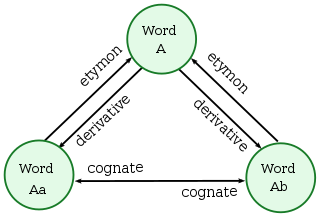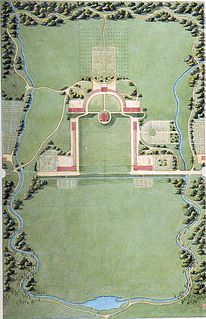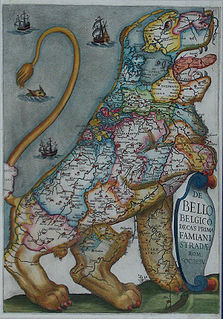Related Research Articles

In historical linguistics, cognates, also called lexical cognates, are sets of words in different languages that have been inherited in direct descent from an etymological ancestor in a common parent language. Because language change can have very radical effects on both the sound and the meaning of a word, cognates may not be obvious, and often it takes rigorous study of historical sources and the application of the comparative method to establish whether lexemes are cognate or not.

A campus is traditionally the land on which a college or university and related institutional buildings are situated. Usually a college campus includes libraries, lecture halls, residence halls, student centers or dining halls, and park-like settings.
The term Yankee and its contracted form Yank have several interrelated meanings, all referring to people from the United States. Its various senses depend on the context, and may refer to New Englanders, residents of the Northern United States, or Americans in general. According to the Oxford English Dictionary, it is "a nickname for a native or inhabitant of New England, or, more widely, of the northern States generally".
The suffix -onym is a bound morpheme, that is attached to the end of a root word, thus forming a new compound word that designates a particular class of names. In linguistic terminology, compound words that are formed with suffix -onym are most commonly used as designations for various onomastic classes. Most onomastic terms that are formed with suffix -onym are classical compounds, whose word roots are taken from classical languages.
A broker is a person or firm who arranges transactions between a buyer and a seller for a commission when the deal is executed. A broker who also acts as a seller or as a buyer becomes a principal party to the deal. Neither role should be confused with that of an agent—one who acts on behalf of a principal party in a deal.

A flea market is a type of street market that provides space for vendors to sell previously-owned (second-hand) goods. This type of market is often seasonal. However, in recent years there has been the development of 'formal' and 'casual' markets which divides a fixed-style market (formal) with long-term leases and a seasonal-style market with short-term leases. Consistently, there tends to be an emphasis on sustainable consumption whereby items such as used goods, collectibles, antiques and vintage clothing can be purchased.
Pikey is a slang term, which is pejorative and considered by many to be a slur. It is used mainly in the UK to refer to people who are of the Traveller community, a set of ethno-cultural groups found primarily in Great Britain and Ireland. It is also used against Romanichal Travellers, Welsh Kale, Scottish Lowland Travellers, Scottish Highland Travellers, and Funfair Travellers.

A chapbook is a small publication of up to about 40 pages, sometimes bound with a saddle stitch.

A huckster is anyone who sells something or serves biased interests, using pushy or showy tactics. Historically, the term meant any type of peddler or vendor, but over time it has assumed pejorative connotations.

A hawker is a vendor of merchandise that can be easily transported; the term is roughly synonymous with costermonger or peddler. In most places where the term is used, a hawker sells inexpensive goods, handicrafts, or food items. Whether stationary or mobile, hawkers often advertise by loud street cries or chants, and conduct banter with customers, to attract attention and enhance sales.

A peddler, in British English pedlar, also known as a chapman, packman, cheapjack, hawker, higler, huckster, (coster)monger, colporteur or solicitor, is a door-to-door and/or travelling vendor of goods.

Chintz is a woodblock printed, painted, stained or glazed calico textile that originated in Golconda in the 16th century. The cloth is printed with designs featuring flowers and other patterns in different colours, typically on a light, plain background.
Keling or Kling is a derogatory term used in parts of Southeast Asia to denote a person originating from the Indian subcontinent. This includes both those from India and overseas Indians. In modern usage it is not commonly capitalised. The term is used in the Malay Archipelago — specifically Malaysia, Indonesia, Singapore and Brunei — but cognates exist in neighbouring countries as well. Although the early definition was neutral and linked to the historical Kalinga kingdom of Eastern India, it is generally considered offensive by Indians in Southeast Asia.
Burgess was a British title used in the medieval and early modern period to designate someone of the Burgher class. It originally meant a freeman of a borough or burgh but later coming to mean an official of a municipality or a representative in the House of Commons.
Theodiscus was a term used in the early Middle Ages to refer to the West Germanic languages. The Latin term was borrowed from the Germanic adjective meaning "of the people" but, unlike it, was used only to refer to languages. In Medieval Western Europe non-native Latin was the language of science, church and administration, hence Latin theodiscus and its Germanic counterparts were used as antonyms of Latin, to refer to the "native language spoken by the general populace". They were subsequently used in the Frankish Empire to denote the native Germanic vernaculars. As such, they were no longer used as antonym of Latin, but of walhisk, a language descendant from Latin, but nevertheless the speech of the general populace as well. In doing so Latin theodiscus and the Germanic reflexes of *þiudiskaz effectively obtained the meaning of "Germanic", or more specifically one of its local varieties – resulting in the English exonym "Dutch", the German endonym Deutsch, the modern Dutch word for "German", Duits, and older Dutch words for Dutch and German and their dialects Diets, and Duuts. In Romance languages the same word yielded the Italian word for "German", tedesco, and the old French word used for Dutch or, depending on the locality, German speakers, tiois.

Street literature is any of several different types of publication sold on the streets, at fairs and other public gatherings, by travelling hawkers, pedlars or chapmen, from the fifteenth to the nineteenth centuries. Robert Collison's account of the subject describes street literature as the "forerunner of the popular press".

The Low Countries comprise the coastal Rhine–Meuse–Scheldt delta region in Western Europe, whose definition usually includes the modern countries of Luxembourg, Belgium and the Netherlands. Both Belgium and the Netherlands derived their names from earlier names for the region, due to nether meaning "low" and Belgica being the Latinized name for all the Low Countries, a nomenclature that became obsolete after Belgium's secession in 1830.
Chapman is an English surname derived from the Old English occupational name céapmann "marketman, monger, merchant", from the verb céapan, cypan "to buy or sell" and the noun form ceap "barter, business, purchase." Alternate spellings include Caepmon, Cepeman, Chepmon, Cypman(n), and Shapman.

The word bespoke has evolved from a verb meaning 'to speak for something', to its contemporary usage as an adjective. Originally, the adjective bespoke described tailor-made suits and shoes. Later, it described anything commissioned to a particular specification. In contemporary usage, bespoke has become a general marketing and branding concept implying exclusivity and limited runs.
References
- Oxford English Dictionary.
- ↑ Hagan, Dr. Anett (August 2019). "Chapbooks: the poor person's reading material". Europeana (CC By-SA). Archived from the original on 2019-08-27. Retrieved 2019-10-10.